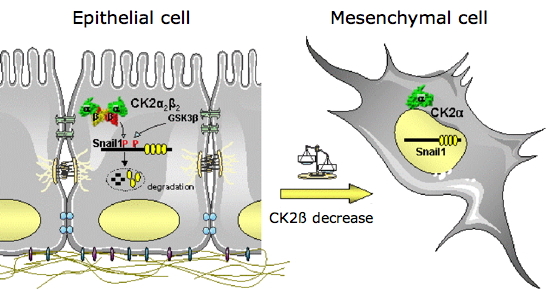By and large, the organ tissues of the human body consist of a collection of cohesive, polarized epithelial cells (i) resting on a membrane. During cancer development, some epithelial cells present in the tumor can reactivate a cellular mechanism called “Epithelial-to-Mesenchymal Transition” (EMT). This process is responsible for the progression of cells from an epithelial state to a mesenchymal state that is characterized by enhanced cellular mobility and resistance to certain anticancer treatments. In the case of a primary tumor, this change may result in the dispersal of cancer cells throughout the body, and the appearance of metastases. This cellular plasticity (ii) is regulated by signaling pathways and transcription factors (iii), such as the factor Snail1.
For the last several years, a team led by Claude Cochet
[1] at the Cancer biology and infection laboratory, has studied the role of the protein kinase (iv) CK2 in cancer pathologies. This enzyme is a complex made from the combination of a catalytic subunit (CK2α) and a regulatory subunit (CK2ß). Now, a collaboration between the team and researchers from the CEA
[2], Inserm, CNRS
[3] and three universities (Aix-Marseille, Joseph-Fourier and Claude Bernard Lyon 1), has shown that deregulation of this protein’s activity (which is observed in certain breast cancers) is linked to the expression of EMT markers. More precisely, the researchers demonstrated with mammary epithelial cells in culture that the reduced expression of CK2ß leads to characteristic EMT changes: by losing their cohesion, some of these cancer cells become mobile and migrate within the body. Cellular, biochemical, and transcriptomic analyses helped to identify Snail1 as a target of this protein kinase. As CK2 can induce the phosphorylation (v) of Snail1, this protein kinase is required to prevent the activation of EMT, and thus reduces the risk of developing metastases. The kinase is therefore essential to maintaining the epithelial state of cells.
 In an epithelial cell, the Snail1 factor is continually degraded in its phosphorylated state. In the absence of the CK2ß subunit (and therefore phosphorylation), the epithelial cells pass from an epithelial state to a more mobile mesenchymal state.
In an epithelial cell, the Snail1 factor is continually degraded in its phosphorylated state. In the absence of the CK2ß subunit (and therefore phosphorylation), the epithelial cells pass from an epithelial state to a more mobile mesenchymal state.
© A. Deshiere/O. Filhol-Cochet
“
These results illustrate the importance of CK2ß in the control of cell plasticity”, says Odile Filhol
[4]. “
They reveal a mechanism that suppresses EMT and maintains the integrity of the epithelial cells”.
Altogether, this study reveals that the protein kinase CK2 is a key regulator of epithelial cell homeostasis. Thanks to its marker properties in several types of cancer and its therapeutic target features, CK2 has acquired the status of a relevant theranostic (vi) biomarker.
(i) The cells that form the tissue covering the surfaces of the body (skin and cavities).
(ii) The property of cells to change their identity.
(ii) The proteins that all forms of life require for gene transcription.
(iv) A protein that carries out cellular mechanisms, such as phosphorylation (by adding a phosphate group to another organic molecule).
(v) See note iii
(vi) A portmanteau word, derived from the words ‘therapeutic’ and ‘diagnostic’. This is the use of in vitro diagnostics to guide patient treatment. Faced with a given disease, clinicians seek certain biomarkers that provide information on the underlying pathophysiological mechanisms, thereby helping to choose the most effective molecule(s) in this context.
[1] Labeled team from the National League against Cancer.
[2] Institute of life sciences research and technologies (iRTSV), Cancer Biology and Infection Laboratory (BCI) - Essential kinases in renal carcinoma team BCI (Inserm/CEA), EDyP service (CEA).
[3] Centre de recherche en cancérologie de Lyon (CNRS/Inserm/Université Claude Bernard Lyon 1/Centre anticancéreux Léon Bérard).
[4] Inserm research associate within the Inserm/CEA/UJF Biologie du Cancer et de l’Infection joint research unit.